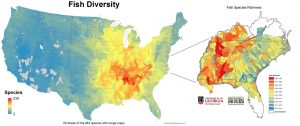Webinar: Protecting Southeastern Freshwater Biodiversity
A New Study to Develop Regional Conservation Priorities and Identify Needed Management and Policy Actions

The Southeastern United States is a global hotspot of freshwater biodiversity, supporting almost two-thirds of the country’s fish species, over 90% of the US total species of mussels, and nearly half of the global total for crayfish species. More than a quarter of the southeast’s species are found nowhere else in the world. Unfortunately, this region is also a hotspot for imperilment – in the last 20 years, the number of imperiled freshwater fish species in the Southeast has risen 125%.
This webinar features the Southeastern Freshwater Biodiversity Conservation Strategy, a data-driven analysis to rank southeastern watersheds based on aquatic biodiversity, endemism, and imperilment conducted by staff from The River Basin Center at the Odum School of Ecology at the University of Georgia and The Tennessee Aquarium Conservation Institute.
In this webinar, you will learn:
- What was revealed when species distribution maps and existing conservation plans for Alabama, Georgia, Mississippi, North Carolina, South Carolina, Tennessee and parts of Louisiana, Kentucky, and Virginia were assembled and analyzed;
- What was learned when recommendations from existing basin- or state-level efforts were integrated into a coordinated set of regional conservation priorities; and
- The outcomes, including identified management actions and policy recommendations.
About the Presenters
Dr. Duncan Elkins is Postdoctoral Associate at the River Basin Center, Odum School of Ecology at the University of Georgia and is the Project Manager of the Southeastern Freshwater Biodiversity Conservation Strategy.
Dr. Bernard R. Kuhajda is the Science Program Manager at the Tennessee Aquarium Conservation Institute and is an expert in surveying and monitoring threatened and endangered species from aquatic systems in the Southeast, in part to help evaluate the effectiveness of conservation programs.




